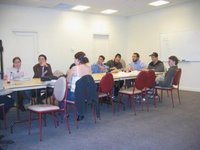Freely translated and excerpted from the Rebbe's letters
11th day of Nissan, 5744 [1984]
Greeting and Blessing:
...One of the details which differentiates the Festival of Pesach from our other festivals is the fact that the Torah emphasizes the exact moment of time when the Geulah (deliverance) from Egyptian bondage came, namely, bachatzi halaila, "in the very middle of the night"; and similarly pinpoints the exact moment of Yetzias-Mitzraim (the Exodus from Egypt), namely, b'etzem HaYom hazeh, "in the very middle of the day."
It was exactly at midnight that the moment of the Geulah struck: Pharoah freed the Jews immediately, bringing the Galus (exile) to an end.
And it was exactly at midday that the Jewish people went out of Egypt "with an uplifted arm," as free men and women and proud to be Jews.
"Night" and "Day" are opposite phenomena, symbolizing the opposing concepts of "darkness" and "light" in the spiritual sense; Especially "midnight" and "midday," connoting, respectively, the bleakest darkness of the night and the brightest light of the day. All this is also connected with the symbolic concepts of the "moon" and of the "sun,"
discussed in a prior letter.
...The fundamental distinction between the sun and the moon, as stated in the Torah: the sun being the "Great Luminary to rule by day," while the moon is the "Small Luminary to rule by night." This indicates two different and contrary ways in their "illuminating the earth": The lunar light, however brightly the moon shines, even at its maximum fullness, does not transform night into day... On the other hand, however weak is the light of the sun on the earth, such as at the beginning of the day or at day's end, when the sun's rays are at their weakest, it still makes "day."...
Avodas-HaShem (serving G-d) encompasses the totality of a Jew's everyday life in all, literally all, detailed aspects, as defined by the principle "Know G-d in all your ways," meaning, to acknowledge and serve G-d in every way and in all activities. These comprise two categories:
Mitzvah (commandment) - the domain of religious duties, and R'Shus - the so-called "secular" domain.
The "Mitzvah" domain embraces all those ways and actions which a Jew is obligated to carry out, because G-d has commanded to do them; these are all matters of Torah and Mitzvos. When a Jew learns Torah and does Mitzvos, he irradiates himself as well as his surroundings and the world at large with the Divine light of Ner Mitzvah vTorah Or ("a Mitzvah is a lamp and the Torah is light"). Whether he does it with a full measure of inspiration or, sometimes, with less enthusiasm, it is always the Mitzvah lamp and the Torah light - the "Great Luminary" (the sun) in G-d's service.
The second category, that of R'shus, is the domain of ordinary matters, such as eating, drinking and the like, which in and of themselves are not a Mitzvah (except on Shabbos and Yom Tov, or in the case of saving a life, etc.).
And although the so-called secular aspects of everyday life should, and must, be ruled by the Torah, Torah Or, they are not comparable to Torah and Mitzvos. They receive their minor light of a "Small Luminary" from the Torah, the "Great Luminary," similar to the way the moon is illuminated, and illuminates, by reflecting the light of the sun.
In one realm of R'shus in particular, because of its close association with powerful natural tendencies, special vigilance is called for in order to insure that it be l'Shem-Shomayim, "for the sake of Heaven." If even in the realm of Mitzvos there is the possibility of "performance by rote," where routine practice could not only pose a hindrance to growth, but even to the proper observance of the Mitzvos themselves - how much more so in the "secular" matters, where habit can cause, G-d forbid, a downright debasement, even to the extent of the opposite of the sake of heaven, e.g. gluttony, drunkenness, and the like. Hence, a special vigilance and a special effort is required to infuse in this area of everyday life an ever greater measure of l'Shem-Shamayim, a growing measure of light, reaching out for the "moon at its fullest"; though even then it still is only for the sake of Heaven - to be utilized later in the performance of Torah and Mitzvos. In the meantime it is still "night," the realm of R'shus.
This is one of the lessons from the emphasis on the deliverance taking place at midnight, alluding, as mentioned, to R'shus - matters, which, in relation to Torah and Mitzvos, are like "night" to "day," namely, that even in the most materialistic aspects of secular matters one can, and must, completely free one's self from "Galus Mitzrayim"
(subservience to materialism and its limitations).
Similarly also in matters which are alluded to "midday," namely, matters of Ner Mitzvah vTorah Or, when one has reached the height of one's strength and brightness - there is a need of "Yetzias Mitzrayim," of breaking through and elevating oneself above all limitations and standards, including those of the realm of holiness - to break out of one's complacency with one's self and with one's standards, and of the feeling of having completely satisfied one's desire. On the contrary, regardless of how high are one's achievements, one must strive for still higher standards so we declare in our daily prayers, both in the day and at night: To love G-d with all one's might, totally surrendering one's desire to G-d.
With esteem and with blessing for a Kosher and Joyous Pesach
Thank you for your comments, feedback and suggestions
- Please click here to send us your comments, feedback or suggestions
- There are currently "3719" members.
- Please note that the underlined bullets on the left side of this page are links, which are updated weekly.
- Contact Us
A current Insight:
When you give for a worthy cause, it is really only a loan and G-d Himself is the guarantor. Furthermore, the more you give, the more you get. I don't mean this figuratively. I say so you will test it and see for yourself



No comments:
Post a Comment